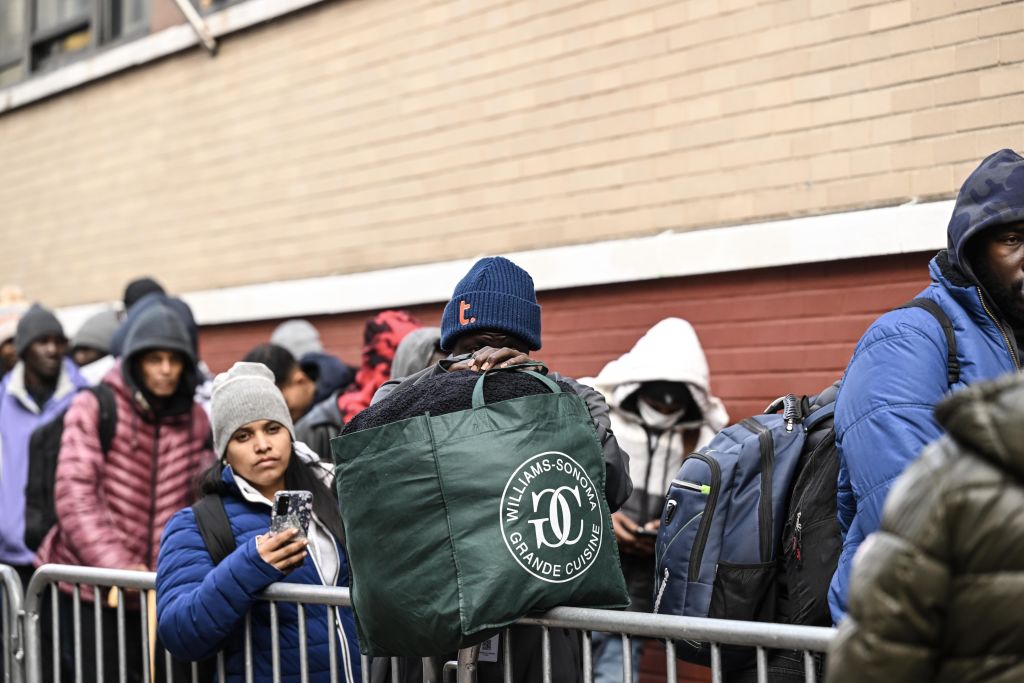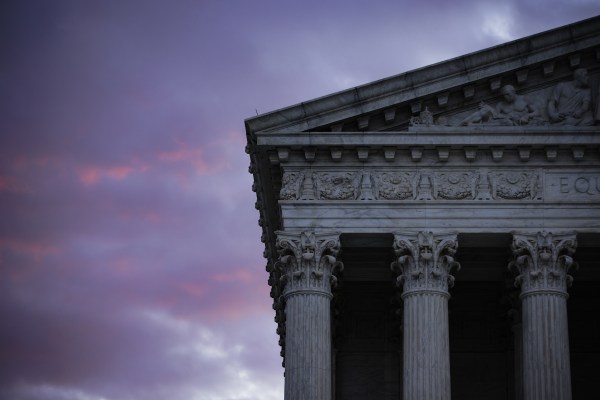With primary season kicking into high gear, warnings about potential voter fraud are circulating—and recirculating. A Dispatch reader forwarded a screenshot of a Twitter post he saw shared on Facebook suggesting that illegal immigrants could be able to vote with government-issued ID cards.
Accusations that ID cards could be used by undocumented immigrants to vote surfaced last fall after Fox News released leaked photos of cards intended for eventual distribution to migrants crossing the border.
Former President Donald Trump has repeatedly spread a related theory that Democrats support bringing undocumented immigrants into the country so that they can vote. He recently made the claim on January 5 during a speech in Iowa. “I believe now that is why they’re allowing these people to come in. People that don’t speak our language, they’re signing them up to vote,” Trump said. “I believe that’s why you’re having millions of people pour into our country, and it could very well affect the next election, and I believe that’s why they’re doing it.”
The program to distribute ID cards to immigrants has nothing to do with voting, however, and it is still illegal for noncitizens to vote in federal elections. “This card is not going to allow noncitizens, especially noncitizens who have no immigration status, to vote,” Alberto Benítez, a professor of clinical law and the director of George Washington University’s Immigration Clinic, told The Dispatch Fact Check. “It’s not a voter registration card.”
In July 2022, multiple media outlets reported that the Biden administration was planning to test a pilot program granting temporary ID cards to unauthorized immigrants. The program, known as the ICE Secure Docket Card Program, was granted $10 million of funding in Congress’ 2023 appropriations bill. “The ICE secure docket card concept is a pilot program that would modernize documentation provided to some noncitizens,” an ICE spokesperson told The Dispatch Fact Check in an emailed statement. “While the specifics of the card and pilot are under development, it is important to note the secure card will not be an official form of federal identification. The secure card will indicate it is for use by DHS agencies and would be provided only after national security background checks have been performed.”
The ID cards are intended to make it easier for unauthorized immigrants to access essential information like court documents, and they would allow law enforcement officers to more easily identify and determine whether individuals are already in the immigration system. “Currently, noncitizens receive paper documents from the federal government about their immigration status,” the ICE spokesperson explained. “Paper documents pose a security risk, are easily lost, and degrade rapidly in real-world use, creating inefficiencies for the government and noncitizens. Moving to a secure card will save the agency millions, free up resources, and ensure information is quickly accessible to DHS officials while reducing the agency’s FOIA backlog.”
Noncitizens in the United States—referred to primarily as “aliens” in U.S. law—cannot vote for federal offices regardless of whether they hold any form of federal identification, including for the office of president, vice president, or for presidential electors. “You have to be a U.S. citizen to be able to cast the vote. If you’re not documented or illegal, you can’t vote legally,” David Schultz, a national expert on election law, told The Dispatch Fact Check. Title 18, Section 611 of the U.S. Code specifies that noncitizens who vote for any federal office will be fined, imprisoned for no more than one year, or both, and Title 8, Section 1227 says that, “Any alien who has voted in violation of any Federal, State, or local constitutional provision, statute, ordinance, or regulation is deportable.” Title 8, Section 1182 similarly states that aliens who have voted illegally are ineligible to receive visas or be admitted into the country.
There are some exemptions to legal penalties for noncitizen voting, primarily for the children of immigrants who may not be aware of their noncitizen status—though voting is still not permitted for these individuals. In cases when the parents of a noncitizen are both current or former citizens, when a noncitizen has lived permanently in the country prior to the age of 16, or when a noncitizen reasonably believes they were a citizen at the time of voting, the legal penalties for noncitizen voting do not apply.
Some localities, such as San Francisco, Oakland, and the District of Columbia, allow noncitizens to vote in at least some local elections, though this is not common. In 2022, a judge in New York ruled that a New York City law allowing noncitizen voting violated the state’s constitution. According to Schultz, political parties might even legally allow noncitizens to vote in party-run caucuses. However, voting in typical primary elections would be illegal due to the state being significantly involved in its operation. “Since there’s significant state action in terms of running a primary, the same rule would apply at that point,” Schultz explained.
If you have a claim you would like to see us fact check, please send us an email at factcheck@thedispatch.com. If you would like to suggest a correction to this piece or any other Dispatch article, please email corrections@thedispatch.com.







Please note that we at The Dispatch hold ourselves, our work, and our commenters to a higher standard than other places on the internet. We welcome comments that foster genuine debate or discussion—including comments critical of us or our work—but responses that include ad hominem attacks on fellow Dispatch members or are intended to stoke fear and anger may be moderated.
With your membership, you only have the ability to comment on The Morning Dispatch articles. Consider upgrading to join the conversation everywhere.